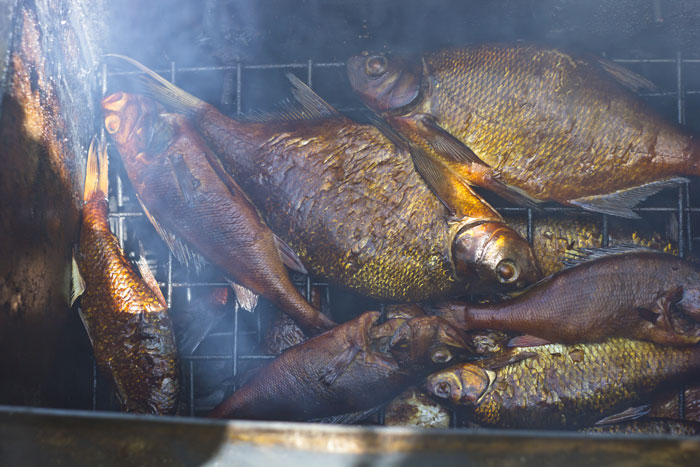How a UN project improved the livelihoods of fish-smoking women in Sri Lanka
- Like
- Digg
- Del
- Tumblr
- VKontakte
- Buffer
- Love This
- Odnoklassniki
- Meneame
- Blogger
- Amazon
- Yahoo Mail
- Gmail
- AOL
- Newsvine
- HackerNews
- Evernote
- MySpace
- Mail.ru
- Viadeo
- Line
- Comments
- Yummly
- SMS
- Viber
- Telegram
- Subscribe
- Skype
- Facebook Messenger
- Kakao
- LiveJournal
- Yammer
- Edgar
- Fintel
- Mix
- Instapaper
- Copy Link
Posted: 22 November 2017 | George Smith (New Food)
In a region where many women operate small, labour-intensive and low-output smoked fish businesses, the FAO has stepped in to change the game.


CATCH OF THE DAY: Smoked fish is a livelihood in some Sri Lankan communities.
“The first thing I noticed was that the new technology helps me save time,” said Kopalapillai Theivarmallar who makes her living from fish-smoking to provide for her three daughters.
“Before, I spent a total of 12 hours on two consecutive days drying and smoking the fish, and I used the old method of iron mesh. Now, six to seven hours is enough to finish one smoking. It gives me plenty of time to take care of my children and do household chores.”
Ms Theivarmallar is one of the beneficiaries of the FTT-Thiaroye, a fish smoking and drying oven project nearly 10 years in the making. It was rolled out by the Food and Agricultural Organization of the United Nations (FAO) to improve fuel efficiency and health issues suffered by the small-scale dryers – most of whom are women.
It consists of smoke-capturing chimneys and oil-catching trays, among other elements, which can be slotted in to an existing oven or purpose built.
In the district that includes Unnichchai, around 150 families are engaged in fish-smoking activities. The traditional smoking method is done in the open, making the fish prone to spoilage from rain and external contamination. Strong winds can lengthen the process and often results in lesser-quality fish that sell at lower prices.
“With the method of iron mesh, our smoked fish is of poor quality, they are sold at 600 to 750 LKR per kilo (approximately $4 to $5). This is a very low price. The money we earn is not even enough to send our children to school,” said Fransis Devamalar, a fish smoker who heads her family of four children.
African success
The FAO technology was first introduced in Africa, where 12 countries have now adopted it. Women using old methods of fish-smoking over an open fire often suffer eye and skin irritations and respiratory disease from the smoke. However, African women who have adopted the new method have improved their health, significantly increased their income, reduced their costs, cut down on losses, improved the quality and safety of their smoked fish, and were able to improve their family’s food security and nutrition.
In June this year, FAO with the European Union Support to District Development Programme (EU-SDDP) introduced the new smoking technology to Asia for the first time, starting with Sri Lanka where fish is a major source of livelihoods and nutrition.
“Introducing the new ovens will help to make the fish value chain in Sri Lanka more productive and profitable for the poorest families,” said FAO’s Representative in Sri Lanka Nina Brandstrup. “We are planning to extend the availability of the new technology to other parts of the country,” she said. This requires guidelines to be prepared in local languages and disseminated, and extension workers trained to advise communities on the construction and use of the ovens.
Constructing the first oven in Unnichchai cost around $1 500 – relatively expensive for small-scale fishing communities. However, the oven is shared among many families and expanding it to other communities will likely rely on micro-finance support from the government, development institutions, NGOs or the private sector.
For Kopalapillai Theivarmallar, she is already seeing the benefits. ‘Before, I could only process 16 to 40 kilos of fish per day, but with the new ovens I can smoke 100 kilos per day. Also, the firewood needed is cheaper. Now I only pay 15 LKR per kilo of fish ($0.09), before it was 50 LKR ($0.32),” she said.
An additional eight ovens are in the process of being constructed under the EU-SDDP project in Sri Lanka. “This is a good entry point to the Asian continent which produces close to half the world’s smoked fish,” explained Yvette Diei Ouadi, an FAO Fishery Officer who coordinates the programme. “Our next stage is looking at national regulatory frameworks to better control the hazards linked to traditional smoking.”
FAO is also helping ensure sustainability of the Sri Lankan project’s success so far by providing fishing communities with technical training on fish quality improvement and packaging, and promoting a market-oriented approach to target buyers in the capital city of Colombo where there is huge and continuous demand for smoked fish.
Related topics
Related organisations
Food and Agricultural Organization of the United Nations (FAO)









